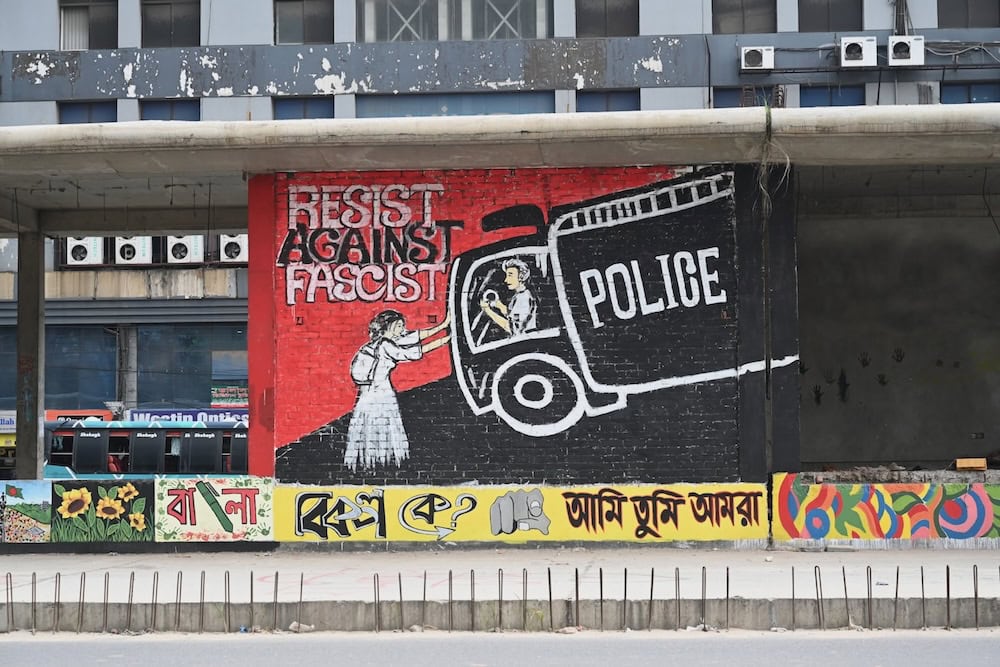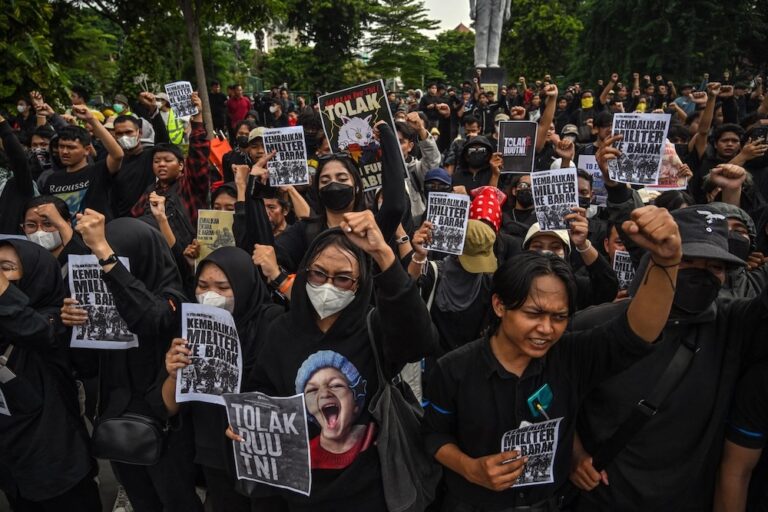August 2024 in South Asia: A free expression and civic space round-up produced by IFEX's regional editor Mong Palatino, based on IFEX member reports and news from the region.
It has been a tumultuous August for South Asia: Student protests forced the resignation of Bangladesh’s prime minister, the Taliban marked their third year in power amid the continuing oppression of Afghan women, Pakistan’s internet encountered disruptions, and Sri Lanka authorities have doubled down on enforcing security laws ahead of a crucial presidential election.
Bangladesh in transition: Upholding truth and justice
Youth-led protests in Bangladesh led to the resignation of the country’s prime minister on 5 August and the inauguration of an interim government three days later. Authorities tried to quell the uprising through the violent actions of the police and pro-government supporters, as well as imposing a news and internet blackout for almost a week, but they all failed to hold back young protesters who were demanding the scrapping of quotas for public sector jobs.
Journalists were targeted and assaulted during the clash between police forces and protesters. Despite the risks and challenges, they continued to report and provided the public and the world with valuable information about what was happening on the ground especially when authorities attempted to conceal the rising number of casualties during the crackdown on protests.
In an interview with Reuters, The Daily Star senior staff correspondent Zyma Islam narrated the efforts of journalists to seek the truth about the extent of the killings during the protests.
“We mined social media for news people shared about their loved ones; we also reached out to university clubs, but many people who died didn’t go to university. That’s why we went to the hospital morgues, even though we knew only a subset of all bodies ended up in autopsy. We also went to the graveyards, where we found a few freshly-dug graves of victims who died of gunshot wounds.”
After the replacement of the government, global media watchdogs underscored the need to uphold the work of the media and pursue accountability against those who attacked journalists. Reporters Without Borders (RSF) emphasised that “the role of journalists is more essential than ever during this decisive period for the country’s future.” The Committee to Protect Journalists (CPJ) asserted that “all sides in Bangladesh must ensure that journalists can report safely during this delicate time of political transition.”
IFEX urged the interim government to undertake reforms that will restore trust in the media.
“The protection, support, and promotion of all journalists and media outlets is crucial for media pluralism and to foster a safe and enabling environment for diverse voices to flourish. In turn, this will pave the way for a healthy information ecosystem and the restoration of public trust in the media.”
RSF has called for the withdrawal of charges against eight journalists facing prosecution under repressive online security laws. A welcome development was the dismissal of the case of Prothom Alo journalist Rozina Islam, who was charged with violating the Official Secrets Act three years ago.
After 3 years and 3 months we can finally celebrate the acquittal of charges against journalist and #FreePressAward winner #RozinaIslam. We admire the great resilience and commitment she has continuously shown to journalism and the truth. #JournalismIsNotACrime pic.twitter.com/Wjm5UdPhG1
— Free Press Unlimited (@freepressunltd) August 19, 2024
“Women’s rights crisis”: Three years of Taliban rule in Afghanistan
The Taliban marked their third year of reclaiming power in Afghanistan with media and global civil society groups denouncing the systemic attacks targeting journalists, women, and human rights defenders.
Human Rights Watch (HRW) said that the Taliban “have created the world’s most serious women’s rights crisis” with Afghan women and girls “living their worst nightmares” because of the harsh restrictions and prohibitions they face.
The situation of the local media has not improved either. IFEX member Afghanistan Journalists Center recorded 181 incidents of press freedom violations over the past year. CPJ reported that the Taliban have detained at least 16 Afghan and foreign journalists, shut four radio and TV stations, and suspended the licenses of 14 media outlets. RSF said that 141 journalists have been arrested or detained since August 2021.
The Taliban government has also issued more than 15 media directives that affected the work of journalists, especially women. The recently passed vice and virtue law, which restricts the publication of media content, including a ban on images of living beings, is an example of how the strict interpretation and enforcement of religious doctrines had seriously undermined the operations of the local media.
“These provisions are ambiguous and subject to varying interpretations, potentially leading to further suppression of free media and journalists,” the AFJC said in a statement.
PEN International added that “the Taliban’s violent intolerance towards dissent of any kind has resulted in a suffocating climate of self-censorship, silencing Afghanistan’s once-vibrant cultural sphere.”
Disruptions in Pakistan’s internet
Aside from the blocking of X (Twitter) after the February election, internet users noticed slower connections in succeeding months. Initially, authorities denied the slowdown but they later attributed it to the increasing usage of Virtual Private Networks. This was debunked by experts who pointed out that the slower access could be linked to the government’s trial of an upgraded web management system.
There’s no confirmation if a national firewall is being set up, but IFEX member Pakistan Press Foundation has expressed dismay over the “lack of clarity, accountability, and transparency in the management and regulation of digital media and the internet.”
Bytes for All, another IFEX member, has released a comprehensive report on the country’s internet landscape, which highlighted the major developments and policies laid out by the government. The report mentioned that the passage of the E-Safety Bill “escalated distrust and criticism of government bodies.” Earlier, IFEX linked this legislation to other new regulations unveiled by the government and warned against the “attempt to control free expression and access to information at a time when attacks against journalists, activists, human rights defenders, and others exercising their free expression rights have been on the rise.”
Civic space concerns ahead of Sri Lanka’s presidential election
More than 17 million people are expected to vote in the 21 September election in Sri Lanka amid the economic downturn and deterioration of the country’s civic space.
Despite being swept to power after the massive Aragalaya protests in 2022, the government of President Ranil Wickremesinghe has been accused of suppressing dissent and undermining freedom of expression. Last week, the United Nations High Commissioner for Human Rights released a report expressing alarm over “new regressive laws, erosion of democratic checks and balances, instances of threats, intimidation and violence against victims, civil society actors and journalists and resurfacing of serious human rights violations of the past.”
An example of “regressive” legislation is the Online Safety Act, which gives broad powers to the security forces to restrict content, curb access, and prosecute individuals. Laws like the Prevention of Terrorism Act and the International Covenant on Civil and Political Rights Act of 2007 have been weaponised to stifle dissent. Even comedians, poets, and other artists have been charged under these laws for allegedly attacking Buddhism.
Meanwhile, journalists covering protests have been physically attacked and targeted with prosecution. As police increasingly relied on violent methods to disperse protests, journalists have been assaulted too and arbitrarily detained.
IFEX has posted a series of threads on X (Twitter) highlighting the alarming decline of free speech in the country.
In brief: Good news in Nepal
Nepal’s Supreme Court has ruled that Rukshana Kapali, a transgender woman petitioner, should be legally recognised as a woman without having to submit to medical verification. This was welcomed by human rights advocates who hailed the ruling as a victory for the LGBTQI+ community. Kyle Knight of HRW urged Nepali authorities to expand the scope of the ruling.
“A better solution is a central policy. The government can and should make the system work for everyone by issuing a directive that allows people to self-identify their gender on official documents, without medical or other verification.”
Meanwhile, the government has lifted the ban on popular social media platform TikTok, which was blocked nine months ago for allegedly spreading content that “disturbs social harmony and disrupts family structures and social relations.” IFEX member Freedom Forum welcomed the news and reiterated that the government’s blanket restriction on the online platform was against people’s right to freedom of expression and speech.
Freedom Forum also organised a roundtable discussion on the proposed Media Council Bill attended by various stakeholders, including lawmakers who vowed to look into the proposed amendments and other concerns to ensure that the legislation will uphold free speech. Freedom Forum urged legislators to strengthen the Media Council’s independence and review provisions empowering authorities to regulate social media networks.



